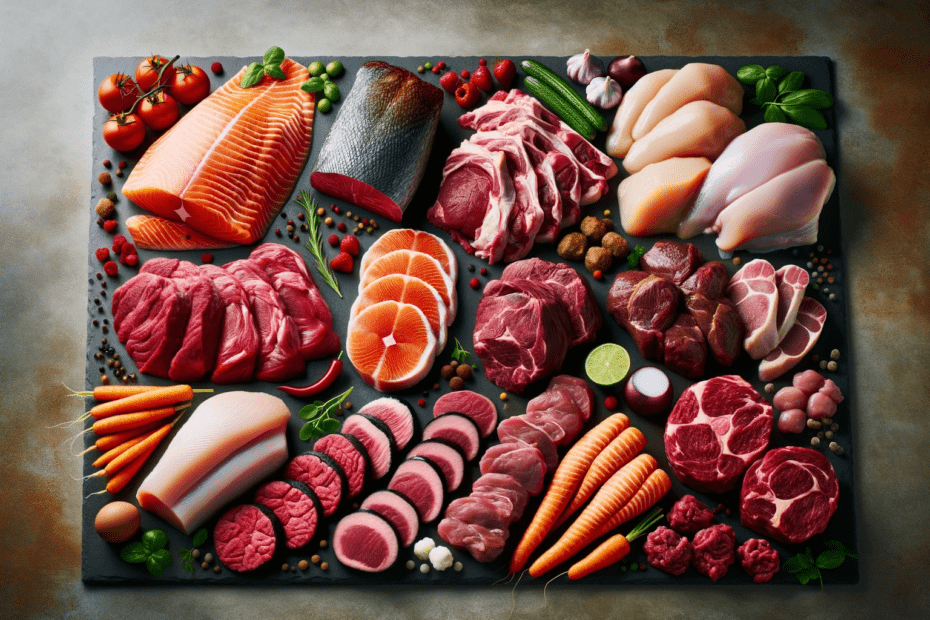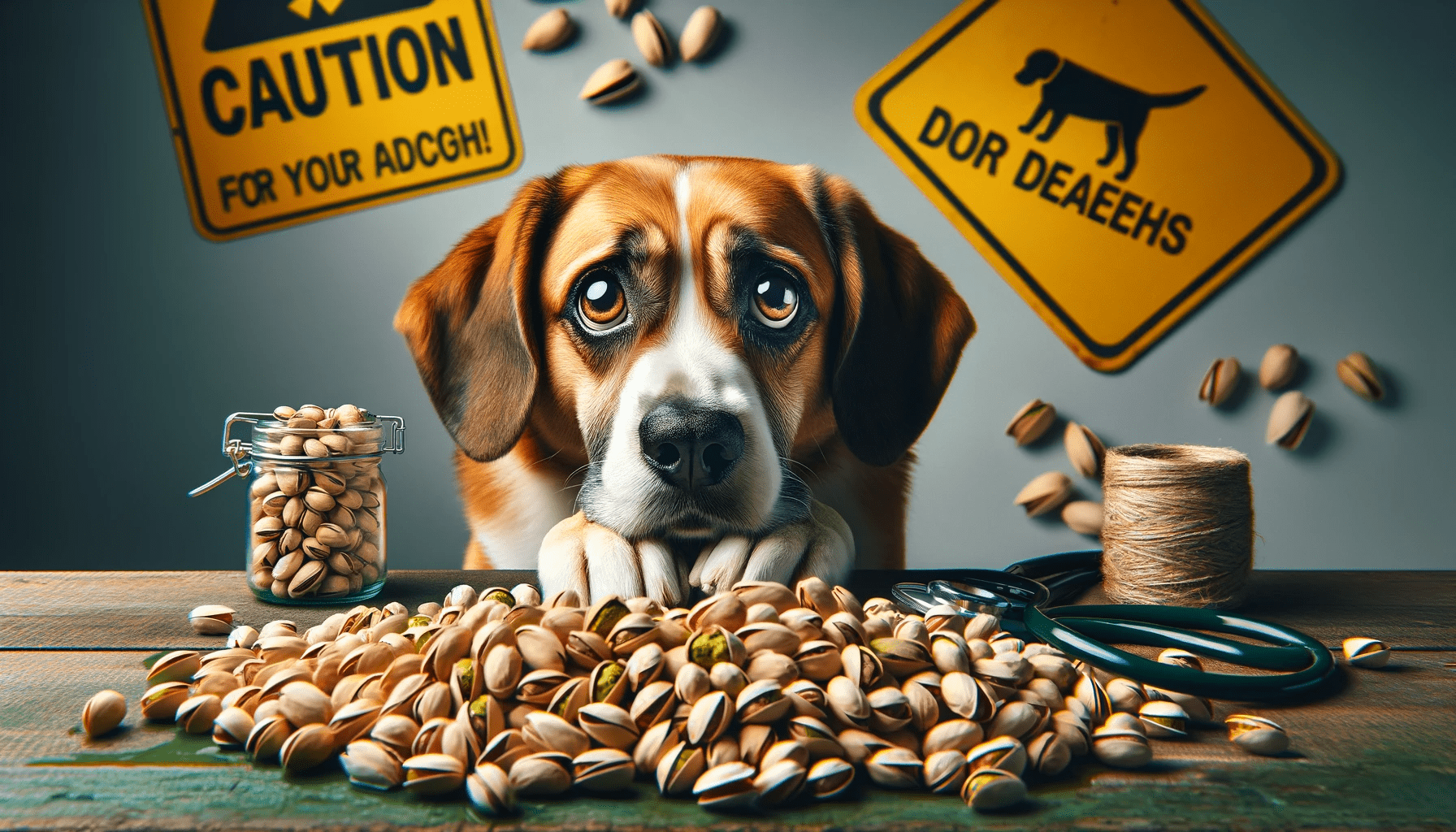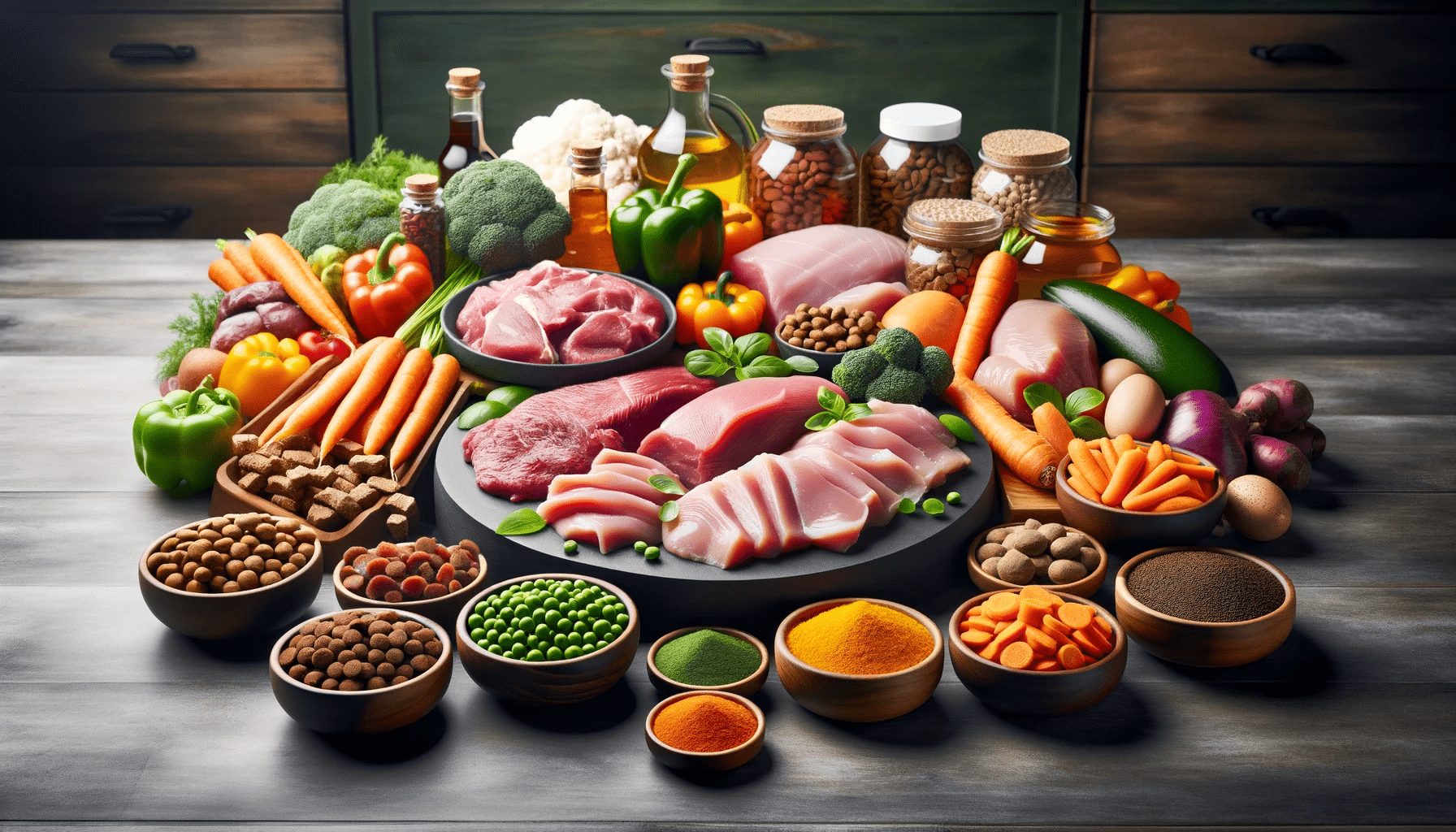If you're looking to give your furry friend the best nutrition possible, you'll want to focus on the right proteins.
In this article, we'll explore the top eight proteins for optimal dog nutrition. Chicken, beef, salmon, lamb, turkey, duck, venison, and bison all provide essential nutrients to support your dog's overall health.
By incorporating these proteins into their diet, you can ensure they receive the balanced nutrition they need for a happy and healthy life.
Key Takeaways
- Chicken and beef are high-quality sources of protein for dogs, providing essential amino acids for overall health and supporting muscle development, immune system function, and a shiny coat.
- Other protein options like fish (such as salmon) and lamb are also beneficial, with fish providing omega-3 fatty acids for skin and coat health, and lamb being suitable for allergies or sensitivities.
- When cooking beef, proper techniques like grilling (direct or indirect), marinating, or slow cooking methods like crockpot, braising, and stewing should be used to ensure safety and retain flavor and tenderness.
- Other protein options like turkey, duck, venison, and bison offer lean protein sources with essential nutrients, each with their own unique benefits and suitable cooking methods to consider.
Chicken
Chicken is a high-quality source of protein that's essential for your dog's optimal nutrition. Incorporating chicken into your dog's diet can provide numerous nutritional benefits.
Chicken isn't only a lean protein, but it also contains essential amino acids that are necessary for your dog's overall health. It's easily digestible and can help maintain and repair tissue, promote healthy skin and coat, and support a strong immune system.
When preparing chicken for your dog, it's important to avoid using any seasonings or additives that could be harmful to them. Stick to simple recipes that involve baking or boiling the chicken without any added ingredients. This ensures that your dog receives all the nutritional benefits without any potential risks.
Chicken is a versatile ingredient that can be used in various recipes for your dog. You can prepare shredded chicken and mix it with cooked vegetables or grains to create a balanced meal. Another option is to make chicken broth by boiling chicken with water and then using the broth to moisten your dog's dry food.
Remember to always consult with your veterinarian before making any changes to your dog's diet. They can provide guidance on the appropriate portion sizes and frequency of feeding chicken to your furry friend.
Beef
When it comes to choosing protein options for your dog, beef is another excellent choice.
Not only does beef provide a good source of high-quality protein, but it also contains important nutrients such as iron, zinc, and B vitamins.
Additionally, beef can be prepared using various cooking methods to suit your dog's preferences and nutritional needs.
Other Protein Options
For optimal dog nutrition, you can also provide your furry friend with a variety of other protein options, such as beef. While beef is a popular protein choice for dogs, it's important to consider cooking tips to ensure its nutritional value is preserved. Here are some alternative protein sources you can consider:
- Chicken: A lean protein that's rich in essential amino acids. Cooked chicken can be a great addition to your dog's diet.
- Fish: High in omega-3 fatty acids, fish like salmon or sardines can support your dog's skin and coat health.
- Lamb: A good source of protein and essential vitamins, lamb can be an excellent option for dogs with allergies or sensitivities to other meats.
Remember to consult with your veterinarian to determine the best protein options and quantities for your dog's specific needs.
Benefits of Beef
Beef offers a multitude of benefits for your dog's nutrition, making it an excellent protein choice. The health benefits of beef are numerous. It's a rich source of high-quality protein, essential amino acids, and vitamins like B12 and zinc. These nutrients contribute to muscle development, immune system function, and overall vitality in dogs. Additionally, beef contains healthy fats that support cognitive function and a shiny coat.
When it comes to cooking techniques for beef, it's important to ensure that it's properly cooked to eliminate any potential bacteria or parasites. This can be achieved through methods such as grilling, baking, or boiling.
However, it's crucial to feed beef in moderation and choose lean cuts to maintain a balanced diet for your furry friend.
Cooking Methods for Beef?
Are you unsure about the best cooking methods to ensure the safety and nutritional benefits of beef for your dog? Cooking beef properly is essential to provide your furry friend with a healthy and delicious meal. Here are some grilling techniques and slow cooking methods that you can use:
- Grilling Techniques:
- Direct grilling: This method involves cooking beef directly over high heat. It gives the meat a nice sear and locks in the juices.
- Indirect grilling: With this method, you cook the beef away from direct heat. It allows for slower cooking and helps to retain moisture.
- Marinating: Marinating the beef before grilling can add flavor and tenderness to the meat.
- Slow Cooking Methods:
- Crockpot: Slow cooking beef in a crockpot allows the flavors to develop over time, resulting in tender and juicy meat.
- Braising: This method involves browning the beef and then cooking it in liquid over low heat. It helps to break down tough cuts and infuse them with flavor.
- Stewing: Stewing involves cooking beef in a liquid-based sauce at a low temperature for an extended period. It results in tender and flavorful meat.
Salmon
When it comes to providing your dog with optimal nutrition, incorporating salmon into their diet can be highly beneficial.
Salmon is a popular protein choice for many dog owners due to its numerous health benefits. Not only is salmon a great source of high-quality protein, but it's also rich in omega-3 fatty acids, which can improve your dog's skin and coat health. Additionally, salmon is packed with essential vitamins and minerals, such as vitamin D and selenium, that support your dog's overall well-being.
To ensure that your dog receives the maximum nutritional benefits from salmon, it's important to use proper cooking techniques. Cooking methods like baking or steaming are recommended as they retain more nutrients compared to frying or grilling. It's also crucial to cook the salmon thoroughly to eliminate any potential bacteria or parasites that could be harmful to your dog.
Lamb
To continue providing your dog with optimal nutrition, consider including lamb in their diet for its unique set of health benefits. Lamb is a protein source that offers a variety of nutrients and can be prepared using different cooking techniques to maximize its nutritional value. Here are some key health benefits of incorporating lamb into your dog's diet:
- Rich in essential amino acids: Lamb is a complete protein source, meaning it contains all the essential amino acids that dogs need for proper growth and development.
- High in vitamins and minerals: Lamb is a good source of vitamins and minerals such as iron, zinc, and vitamin B12, which are important for maintaining a healthy immune system and promoting overall well-being.
- Easily digestible: Lamb is a highly digestible protein, making it an excellent option for dogs with sensitive stomachs or food allergies.
When preparing lamb for your dog, it's important to cook it thoroughly to eliminate any possible bacteria or parasites. You can use cooking techniques such as baking, grilling, or boiling to ensure that the lamb is cooked to a safe internal temperature.
Turkey
Turkey is a lean protein source that provides essential nutrients for your dog's optimal nutrition. It's a nutrient-rich meat option that contains high levels of vitamins and minerals, including iron, zinc, and B vitamins.
Additionally, turkey is often recommended for dogs with sensitive stomachs, as it's easily digestible and less likely to cause gastrointestinal issues.
Lean Protein Source
You can't go wrong with adding turkey to your dog's diet as a lean protein source. Turkey isn't only delicious but also provides numerous health benefits for your furry friend.
Here are some reasons why turkey is a great choice:
- High protein content: Turkey is packed with high-quality protein, which is essential for your dog's muscle development and overall health.
- Low fat options: Turkey breast meat is low in fat, making it an ideal choice for dogs that need to maintain a healthy weight or have a history of pancreatitis.
- Vegetarian protein alternatives: If your dog has allergies or sensitivities to common protein sources like beef or chicken, turkey can be a great alternative.
Remember to consult with your veterinarian to determine the appropriate amount of turkey to include in your dog's diet and ensure a balanced nutrition plan.
Nutrient-Rich Meat Option
For optimal dog nutrition, one meat option that's incredibly nutrient-rich is turkey. Turkey is a lean source of protein that provides essential amino acids necessary for your dog's growth and maintenance. It's rich in vitamins B6 and B12, which support brain function and help maintain a healthy nervous system. Turkey also contains selenium, a mineral that acts as an antioxidant, protecting your dog's cells from damage.
In addition to its nutrient profile, turkey is a great option for dogs with food sensitivities or allergies. It's less likely to cause adverse reactions compared to other meats.
However, if you're looking for nutrient-rich plant options or vegetarian protein alternatives, there are other choices available such as lentils, chickpeas, and quinoa, which can also provide your dog with essential nutrients.
Suitable for Sensitive Stomachs
If your dog has a sensitive stomach, incorporating turkey into their diet can be a beneficial option. Turkey is often recommended for dogs with special dietary needs due to its hypoallergenic properties. Here are three reasons why turkey is suitable for dogs with sensitive stomachs:
- Easily digestible: Turkey is a lean protein that's easily digested by dogs, making it gentle on their sensitive stomachs.
- Low in fat: Turkey is a low-fat protein source, which can help prevent digestive issues and promote optimal digestion in dogs with sensitive stomachs.
- Rich in nutrients: Turkey is packed with essential nutrients like protein, vitamins B6 and B12, zinc, and selenium, which are important for maintaining overall health and supporting a strong immune system.
Duck
When choosing proteins for your dog's optimal nutrition, consider including duck as a healthy and flavorful option. Duck isn't only a delicious choice but also provides several nutritional benefits for your furry friend.
Duck meat is an excellent source of high-quality protein, which is essential for muscle development and overall growth. It's also rich in essential amino acids, such as lysine and methionine, that contribute to the maintenance of a strong immune system and healthy skin and coat.
In addition to its nutritional value, duck meat offers various cooking methods that can be used to prepare delectable meals for your canine companion. You can cook duck by roasting, grilling, or even simmering it. Duck fat can be used as a cooking oil, which adds a unique flavor to the food. However, it's important to note that duck skin should be removed before feeding it to your dog, as it's high in fat and can lead to weight gain or digestive issues.
Venison
Now let's explore the benefits of including venison in your dog's diet for optimal nutrition.
Venison, or deer meat, is a highly nutritious protein source that can offer various health benefits to your furry friend. Here are some reasons why venison is a great addition to your dog's diet:
- Venison is low in fat and high in protein, making it an excellent option for dogs that need to maintain a healthy weight or have specific dietary restrictions.
- It's a novel protein source, which means it's less likely to cause allergies or food sensitivities in dogs with dietary intolerances.
- Venison is rich in essential nutrients like iron, zinc, and B vitamins, which are essential for your dog's overall health and well-being.
To incorporate venison into your dog's diet, you can try preparing homemade venison recipes or opt for commercially available venison-based dog foods. It's important to ensure that the venison is cooked thoroughly to eliminate any potential pathogens.
Remember to consult with your veterinarian before making any significant changes to your dog's diet to ensure it meets their specific nutritional needs.
Including venison in your dog's diet can provide them with a high-quality protein source while offering potential health benefits. Whether you choose to prepare venison recipes at home or opt for commercial options, it's essential to prioritize your dog's nutritional needs for their overall well-being.
Bison
You can incorporate bison into your dog's diet to provide them with a high-quality protein source and potential health benefits. Bison meat is lean, low in fat, and rich in essential nutrients. It contains high levels of iron, zinc, and vitamin B12, which are important for your dog's overall health and wellbeing. Bison meat is also a great option for dogs with food sensitivities or allergies, as it's less likely to cause adverse reactions compared to other meats.
When cooking bison for your dog, it's important to use proper cooking methods to ensure its nutritional value is preserved. Grilling, baking, or broiling are recommended methods as they help retain the natural flavors and nutrients of the meat. Avoid deep frying or heavily seasoning the meat as it can diminish its nutritional benefits.
The benefits of feeding your dog bison meat go beyond just providing them with a high-quality protein source. Bison meat is also known to be a good source of omega-3 fatty acids, which can support your dog's immune system, promote a healthy coat and skin, and reduce inflammation. Additionally, bison meat is often free from hormones, antibiotics, and additives, making it a healthier choice for your furry friend.
Incorporating bison into your dog's diet can be a nutritious and delicious addition. Just remember to cook it properly and consult with your veterinarian to ensure it's suitable for your dog's specific dietary needs.
Frequently Asked Questions
Can Dogs Safely Consume Raw Chicken, Beef, Salmon, Lamb, Turkey, Duck, Venison, or Bison?
Dogs can safely consume raw or cooked chicken, beef, salmon, lamb, turkey, duck, venison, or bison. The key is to ensure the proteins are sourced from reputable suppliers to maintain optimal nutrition and safety.
Are There Any Specific Health Benefits Associated With Feeding Dogs Proteins Like Salmon, Lamb, Venison, or Bison?
Feeding your dog proteins like salmon, lamb, venison, or bison can provide specific health benefits. These proteins are rich in essential nutrients and can promote a healthy coat, strong muscles, and overall well-being. Protein quality is crucial for optimal dog nutrition.
Can Dogs With Allergies or Sensitivities Tolerate Proteins Like Chicken, Beef, or Turkey?
Dogs with allergies or sensitivities may not tolerate proteins like chicken, beef, or turkey. However, there are alternative proteins available that can meet their nutritional needs without triggering adverse reactions.
How Often Should I Rotate Proteins in My Dog's Diet to Ensure a Well-Rounded Nutrition?
To ensure a well-rounded nutrition for your dog, rotate proteins in their diet. Introduce new proteins gradually to avoid digestive issues. Rotating proteins provides a variety of essential nutrients and helps prevent food allergies or sensitivities.
Are There Any Potential Risks or Side Effects Associated With Feeding Dogs Proteins Like Duck or Venison?
When introducing new proteins like duck or venison to your dog's diet, it's important to be cautious. Potential risks of feeding dogs exotic proteins include allergies, gastrointestinal upset, and nutrient imbalances. Gradually introduce new proteins and monitor your dog's reaction.
Conclusion
In conclusion, incorporating high-quality proteins into your dog's diet is crucial for their optimal nutrition.
Chicken, beef, salmon, lamb, turkey, duck, venison, and bison are all excellent protein sources that provide essential amino acids and contribute to muscle development and overall well-being.
By selecting these protein-rich options, you can ensure that your furry friend receives the necessary nutrients for a healthy and balanced diet.






